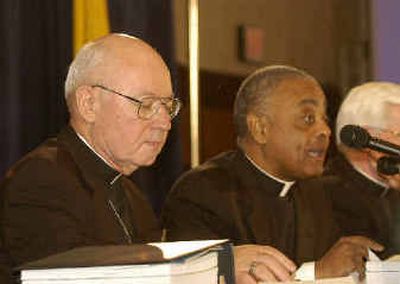Politics play bigger role at bishops meeting

WASHINGTON – When Bishop William Skylstad of Spokane was elected president of the U.S. Conference of Catholic Bishops this week, his margin of victory was unusually close.
Members of this group, which consists of the nation’s Catholic hierarchy, traditionally cast their ballots for the vice president, a position that Skylstad, 70, has filled for the past three years. Although none of the nine other candidates vying for the leadership came close to beating Skylstad, Spokane’s bishop won on the first ballot with only 52 percent of the vote.
His predecessor, Bishop Wilton Gregory of Belleville, Ill., was elected three years ago with 74 percent. In 1998, Bishop Joseph Fiorenza of the Diocese of Galveston-Houston won with 61 percent. And in 1995, Bishop Anthony Pilla of Cleveland received 71 percent of the total votes.
The numbers don’t necessarily reflect poorly on Skylstad, who is highly regarded among this powerful group of church leaders. The votes are confidential, and conference officials wouldn’t speculate about the margin of victory.
The vote may instead be indicative of changing times: The election of the USCCB president, which has always been a rubber stamp, has now become much more politicized.
In addition to criticism over his decision to file bankruptcy for the Spokane Diocese, Skylstad has been under fire from numerous organizations – from victims of clergy sex abuse to laity who demand reform to conservative Catholics who want him to be more outspoken on hot-button issues such as gay marriage and abortion.
Skylstad isn’t alone. Other bishops face similar tensions in their own dioceses.
Those political pressures have been evident every day this week in front of the Hyatt Regency Hotel in downtown Washington, D.C., where about 400 active and retired priests have gathered for their national conference.
Since Sunday evening, the hotel’s sidewalk has served as a stage for a number of organizations to protest in front of the bishops. Wearing rainbow-colored hats, shirts and other articles of clothing, members of Soulforce Inc. have stood outside the hotel singing songs and waving signs that say, “For our lesbian saints” and “Stop the spiritual violence.”
Members of the organization, which has accused the Catholic Church of being homophobic, passed out fliers demanding justice for gay, lesbian, bisexual and transgender people.
Another sign carried the message, “Ordain women as Roman Catholic priests.” Meanwhile, victims of clergy sex abuse held up photos of themselves as children to remind the bishops of their vulnerability when they were molested by priests. Their sign stated: “Help us heal.”
Before Skylstad was elected to the presidency, members of the Spokane area’s Voice of the Faithful wrote a letter addressed to all the bishops discouraging them from voting for Skylstad. “We didn’t think he was qualified and we wanted to get the word out,” said Larry Pember of Colville, one of the founding members of the local VOTF, who are Catholics supporting more involvement from the laity in church decisions.
Along with the Survivors Network of those Abused by Priests, VOTF disapproves of the bishop’s decision to file for bankruptcy. They also claim he hasn’t helped victims and didn’t do enough to protect children who were abused by Patrick O’Donnell, a Spokane priest who has admitted to molesting minors.
Skylstad has said he acted on professional advice in his handling of O’Donnell. He has named priests who have abused children in the diocese, asked victims to come forward and offered to pay for their counseling.
As SNAP and VOTF criticized Skylstad’s election, so, too, did the Catholic League, an organization made up of 350,000 conservative Catholics nationwide. William Donohue, the president, said the bishop already has too much on his hands with the pending bankruptcy to work effectively as head of the USCCB. “We have grave reservations about Skylstad,” said Donohue. “This guy’s saddled with his own problems.”
Unlike VOTF, which advocates for more involvement by the laity, the Catholic League thinks the bishops’ conference needs to do something about the “left-wing lay Catholics who are running the church now.”
“Those of us with a traditional stripe were looking for a shake-up,” said Donohue, who was hoping Pittsburgh Bishop Donald Wuerl would win.
His organization, made up of “practicing Catholics who pay the bills,” wants a leader with moral clarity who will speak out against “all the pro-abortion Catholic politicians who advocate for partial-birth abortions,” he said. He doesn’t think Skylstad will do that.
Archbishop Charles Chaput of Denver, who suggested during the presidential election that pro-choice politicians aren’t really Catholic, received only five votes out of a total of 232. Wuerl got 18.
Another candidate, Bishop Gerald Kicanas of Tucson, got six votes, despite the fact that his diocese filed for bankruptcy in September. No one came close to Skylstad’s 120. Cardinal Francis George, former bishop of Yakima and now archbishop of Chicago, received 53 votes. He eventually was elected the conference’s vice president after several rounds of voting.
Skylstad, during a short speech this week to fellow bishops, acknowledged that the last three years have been the most challenging for the conference. Spokane’s bishop emphasized the need for reconciliation wherever there is division.
Skylstad is the first bishop from the Northwest and only the second from the western United States to be elected president of the USCCB.